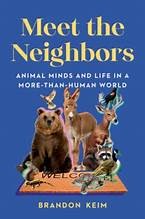English language
Published 2024 by Norton & Company, Incorporated, W. W..

English language
Published 2024 by Norton & Company, Incorporated, W. W..
Honeybees deliberate democratically. Rats reflect on the past. Snakes have friends. In recent decades, our understanding of animal cognition has exploded, making it indisputably clear that the cities and landscapes around us are filled with thinking, feeling individuals besides ourselves. But the way we relate to wild animals has yet to catch up. In Meet the Neighbors, science journalist Brandon Keim asks: what would it mean to take the minds of other animals seriously?
In this wide-ranging exploration of animals' inner lives, Keim takes us into courtrooms and wildlife hospitals, under backyard decks and into deserts, to meet anew the wild creatures who populate our communities and the philosophers, rogue pest controllers, ecologists, wildlife doctors, and others who are reimagining our relationships to them. When we come to understand the depths of their pleasures and pains, the richness of their family lives and their histories, what do we owe so-called …
Honeybees deliberate democratically. Rats reflect on the past. Snakes have friends. In recent decades, our understanding of animal cognition has exploded, making it indisputably clear that the cities and landscapes around us are filled with thinking, feeling individuals besides ourselves. But the way we relate to wild animals has yet to catch up. In Meet the Neighbors, science journalist Brandon Keim asks: what would it mean to take the minds of other animals seriously?
In this wide-ranging exploration of animals' inner lives, Keim takes us into courtrooms and wildlife hospitals, under backyard decks and into deserts, to meet anew the wild creatures who populate our communities and the philosophers, rogue pest controllers, ecologists, wildlife doctors, and others who are reimagining our relationships to them. When we come to understand the depths of their pleasures and pains, the richness of their family lives and their histories, what do we owe so-called pests and predators, or animals who are sick or injured? Can thinking of nonhumans as our neighbors help chart a course to a kinder, gentler planet? As Keim suggests, the answers to these questions are central to how we understand not only the rest of the living world, but ourselves.